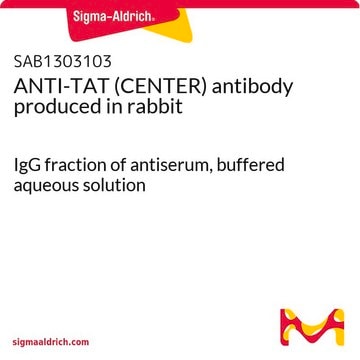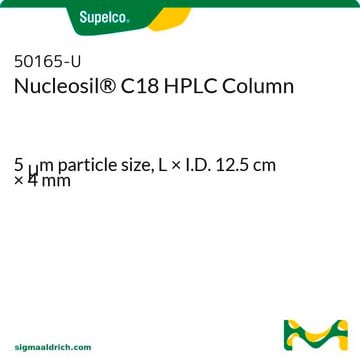推荐产品
生物源
chicken
品質等級
共軛
unconjugated
抗體表格
affinity isolated antibody
抗體產品種類
primary antibodies
無性繁殖
polyclonal
形狀
buffered aqueous solution
製造商/商標名
Genway 15-288-10817F
技術
western blot: suitable
NCBI登錄號
UniProt登錄號
運輸包裝
wet ice
儲存溫度
−20°C
目標翻譯後修改
unmodified
基因資訊
human ... tat(155871)
應用
Anti-TAT antibody produced in chicken is suitable for western blotting at a working dilution of 1:500 and for cell staining at a working dilution of 1:200.
生化/生理作用
TAT (Transactivating regulatory protein) is a trans-activator of human immunodeficiency virus-1 (HIV-1) gene expression and is important for virus replication. It binds to the bulge loop RNA element called TAR, but can also associate with cellular transcription factors. Cyclin T binds with TAT and thereby enhances the affinity of TAT-TAR RNA interaction. Protein arginine methyltransferase-6 (PRMT6) is responsible for methylation of TAT and negatively affects the association between TAT and cyclin T. TAT is involved in the activation of nuclear factor κB (NFκB), a master regulator of pro-inflammatory genes. TAT binds with α5β1 and αvβ3 integrins, and causes vascular cell migration and invasion. At the neural plasma membrane, TAT induces formation of a complex involving the low-density lipoprotein receptor-related protein (LRP), postsynaptic density protein-95 (PSD-95), N-methyl-d-aspartic acid (NMDA) receptors and neuronal nitric oxide synthase (nNOS). This complex is responsible for apoptosis in neurons and astrocytes, causing neurologic dysfunction in AIDS patients.
外觀
Solution in phosphate buffered saline containing 0.02% sodium azide.
免責聲明
Unless otherwise stated in our catalog or other company documentation accompanying the product(s), our products are intended for research use only and are not to be used for any other purpose, which includes but is not limited to, unauthorized commercial uses, in vitro diagnostic uses, ex vivo or in vivo therapeutic uses or any type of consumption or application to humans or animals.
未找到合适的产品?
试试我们的产品选型工具.
儲存類別代碼
10 - Combustible liquids
水污染物質分類(WGK)
WGK 1
閃點(°F)
Not applicable
閃點(°C)
Not applicable
個人防護裝備
Eyeshields, Gloves, multi-purpose combination respirator cartridge (US)
R A Marciniak et al.
The EMBO journal, 10(13), 4189-4196 (1991-12-01)
The Tat protein of HIV-1 trans-activates transcription in vitro in a cell-free extract of HeLa nuclei. Quantitative analysis of the efficiency of elongation revealed that a majority of the elongation complexes generated by the HIV-1 promoter were not highly processive
Giuseppe Fiume et al.
Nucleic acids research, 40(8), 3548-3562 (2011-12-22)
Nuclear factor (NF)-κB is a master regulator of pro-inflammatory genes and is upregulated in human immunodeficiency virus 1 (HIV-1) infection. Mechanisms underlying the NF-κB deregulation by HIV-1 are relevant for immune dysfunction in AIDS. We report that in single round
Baode Xie et al.
Journal of virology, 81(8), 4226-4234 (2007-02-03)
Arginine methylation has been shown to regulate signal transduction, protein subcellular localization, gene transcription, and protein-protein interactions that ultimately alter gene expression. Although the role of cellular protein arginine methyltransferases (PRMT) in viral gene expression is largely unknown, we recently
G Barillari et al.
Blood, 94(2), 663-672 (1999-07-09)
The Tat protein of human immunodeficiency virus type-1 (HIV-1) has been shown to be released during acute infection of T cells by HIV-1 and to promote angiogenesis and Kaposi's sarcoma (KS) development in infected individuals. In this study, we investigated
Eliseo A Eugenin et al.
Proceedings of the National Academy of Sciences of the United States of America, 104(9), 3438-3443 (2007-03-16)
HIV infection of the central nervous system can result in neurologic dysfunction with devastating consequences in AIDS patients. NeuroAIDS is characterized by neuronal injury and loss, yet there is no evidence that HIV can infect neurons. Here we show that
我们的科学家团队拥有各种研究领域经验,包括生命科学、材料科学、化学合成、色谱、分析及许多其他领域.
联系技术服务部门








